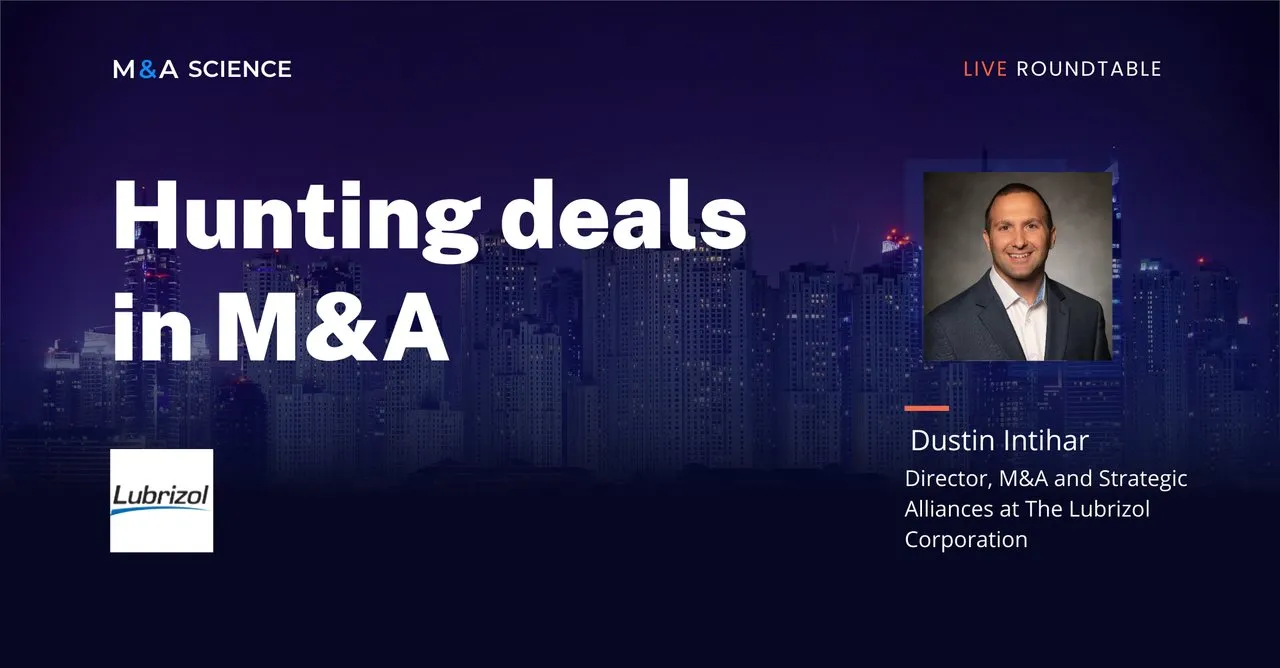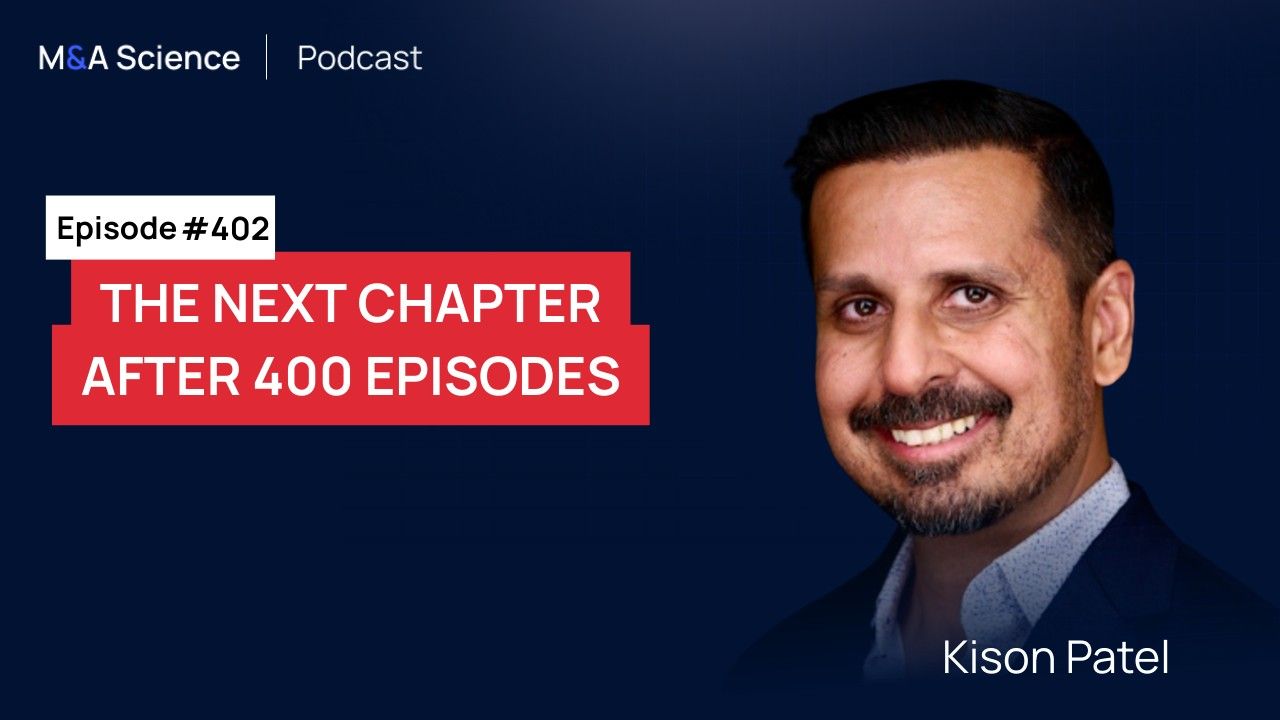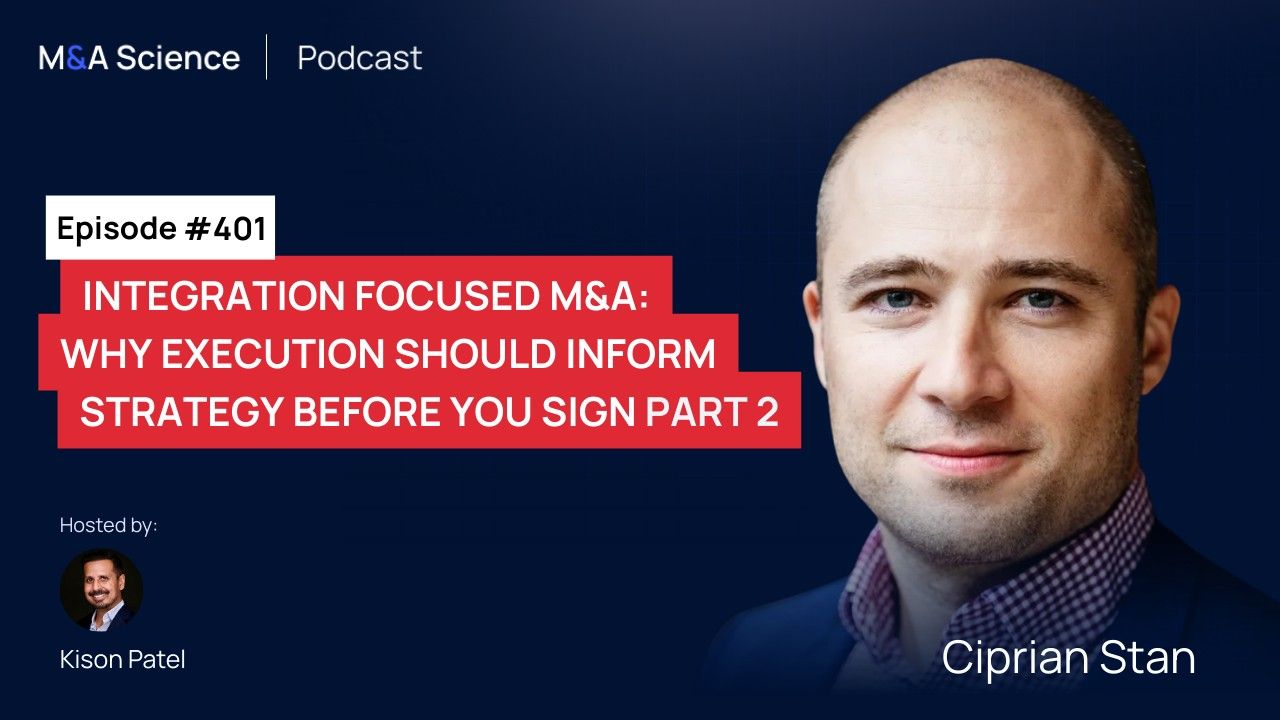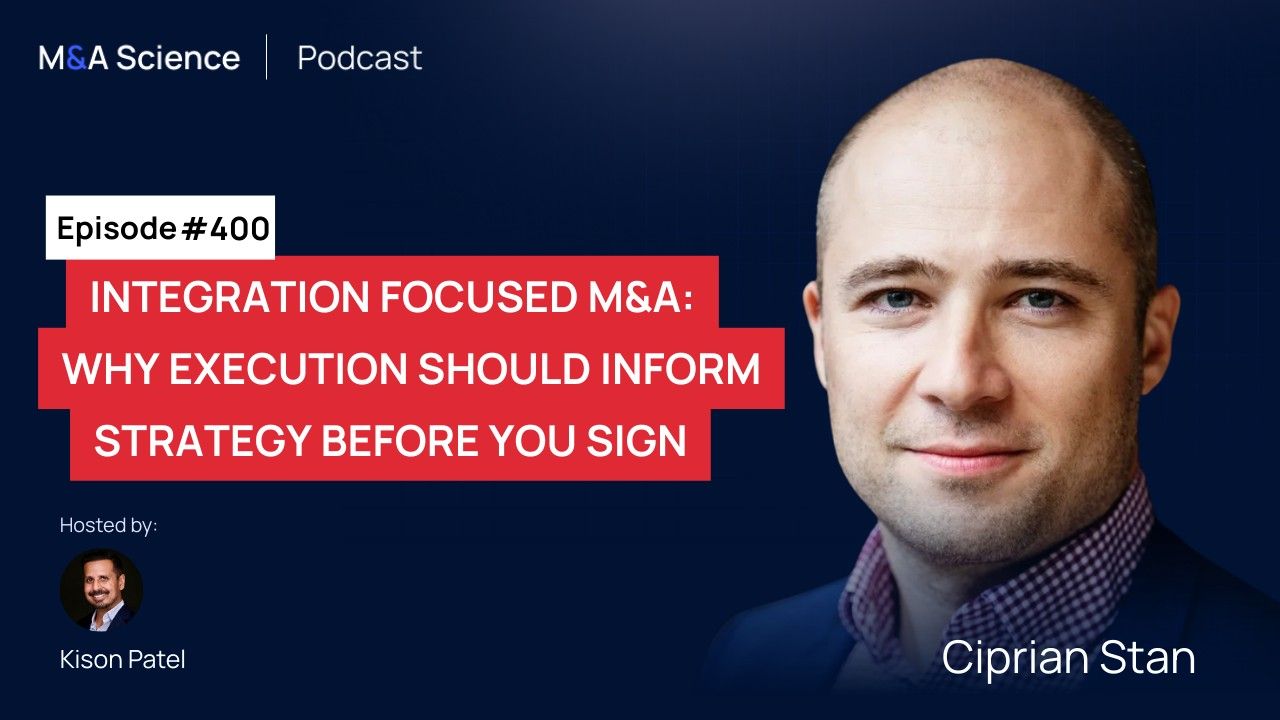
Dustin Intihar
Nearly 15 years of experience delivering results across multiple industries including Healthcare (Cleveland Clinic), Technology and Chemicals. Proven success in small and large multi-billion dollar, Fortune 500 caliber organizations.
Episode Transcript
Text Version of the Interview
How to Hunt Deals in M&A?
There's many private companies out there that have shareholders and owners who really don't want to be found. They want to continue to run their business.
So for me, there are two components to trying to hunt deals. One is, Who's the person for the target company that has the authority to influence a potential deal? And then once you find that person, how do you find their contact information?
To find the right person. I start inside out. I start with my colleagues within Lubrizol. I figure out, is there any connection that we have to the firm, any intel, any insights that we have into the business.
Then I go to my professional network, ask colleagues, LinkedIn connections, try to figure out is there anybody there who could make the introduction, who could share some insights on how to uncover who the right person is,
If that doesn't work, then I go to secondary online research. It's social media, cap IQ, PitchBook, and other online sources, and just start digging and digging to find who is the owner and who is the shareholder.
Sometimes that doesn't work, though. And then you might need to engage either consultant or find former employees and do some blinded calls with them and try to uncover intel that way, maybe engage M&A advisors or even some investment bankers.
I try to start inside out, keep turning over every stone and eventually, you're going to find the right person.
Most of them are third, fourth, fifth-generation family-owned businesses where the families are the owners, but maybe they're not actively involved with running or leading the business anymore. It's just part of their portfolio, but they're not involved.
How to Approach Targets
My mindset is, what's in it for them? You always need to think about what's going to resonate with them? And it's hard because you don't know them yet. You haven't even talked to them yet.
But try to do the front-end work, spend time digging online, and talk to as many people as you can who might have some intelligence to understand what might be their motivators.
Just try to find something to make the pitch or make the outreach a bit more personal to them.
My approach is never to have a copy and paste message for anybody because if they're reading it and it feels like I sent that message to 50 other central owners, they're not going to respond.
Getting Past Gatekeepers
There's a good amount of gatekeepers out there. My mantra is generally to do enough front-end work that I get directly to the individual I'm seeking.
So I'd rather spend a couple of extra days, have a few more conversations to get direct access to that individual rather than going through a gatekeeper. That's usually what I spend my time on is really trying to bypass the gatekeeper at all costs.
Approaching International Deals
My approach to each individual owner is going to differ anyways, regardless of location. But absolutely once you bring in international deals, you have other variables you need to be thinking about. You need to be thinking about language, culture, time zone differences.
You might need an intermediary to speak on your behalf confidentially or not confidential and try to unlock that relationship early on.
So I don't claim to be able to unlock every single door. What I try to do is figure out who's in the best position to unlock that door and try to adjust it based on the type of deal I'm going after.
What's the First Conversation Look Like?
They all look a little bit different. Heading into the conversation I spend a lot of time mapping out all the different scenarios that I can see happening. But once I start the call, I actually try to forget about all that noise. I try to focus on active listening.
I want to keep an open-minded. I want to keep it open to questions and get them talking and see where they take the conversation.
At the end of the day, I want to understand what their culture is, but I also want them to understand our culture. And if it's not a cultural match we might as well find that out sooner, rather than later.
Do You Express Interest To Buy the Target Immediately?
In my view, I'm pretty transparent. I am intentional and explicit with our interests. But do I tell them, Hey I want to buy your company? No. Because actually, I don't know that yet.
I go in open-minded. What I do say is, Hey, we're intentional about a given space. We want to invest in XYZ space. And your company is near the top of that list in terms of partners that we're seeking.
I don't know much about your company yet. So I don't know what the end goal is, but I do know, I want to get to know your firm a bit more. Together there are opportunities we can strengthen each other's business
How Do You Get the First Meeting?
It's all about how that first conversation goes. If it's an awkward conversation and if I get the sense that they're not going to sell ever, or for a few generations, or if they're not interested in a partnership. It's very tough to immediately push for a second meeting.
So in those situations, what I'll do is I let them digest the meeting, digest the information, and give them some time to figure out how that might apply to their own business.
Then maybe follow up a few weeks, a few months later with. I don't want to do for those owners, I don't want to be overly pushy.
Because in Lubrizol, we look for companies and leadership teams to stick with us post-close. We don't buy companies, take out the leadership, put our own people in place. That's not what we do. So it all depends on how the first conversation goes.
On the other end of the spectrum, if I get the sense that they might be open to an investment or maybe eventually an acquisition, or something a bit more where both parties have skin in the game. Then yeah, I'll push for that meeting to get to know each other a bit more.
Dealing with Reluctant Sellers
At the end of the day, a deal is not going to get over the finish line if it's not a win-win.
So if a party truly is not interested in selling, then I look to be creative over time and pitch. Maybe an investment makes more sense. Maybe it allows them to keep the majority shareholder, but also helps de-risk some of their investments.
Coaching Leaders to Improve Deal Sourcing
It's always a challenge. More often than not, they want to start with who's their closest competitor. And that's where their thinking starts and stops sometimes.
But if you have a deal sponsor with the right objectives, the right incentives in place, and the right appetite, let's think about your business today and then let's be aspirational.
What does your business look like five, seven, 10 years from now? Paint the picture for me.
What's your market position 10 years down the road in a given market? What's your offering look like?
What are your capabilities look like at that point?
Get them to paint that picture and show me what the finished product looks like. And then I like to work backward and say, what's your current business look like? The gaps should be fairly obvious. Once you get them to articulate the 5, 7, 10-year vision down the road.
Strategy First Before Target
What I found is, when you talk to someone in the business, they may have a target in mind. As we learn more about the target, we'll let the target shift the strategy. Most of the time, that's not going to get over the finish line.
So I try to get them to develop the vision and the strategy without any target in mind. If we do it in that order, the success rate of getting a deal over the finish line and getting the green light at the end of the day goes way up.
What are the Tools To Build Pipelines?
- Cap IQ,
- PitchBook
- Lux research
- Advanced searching
I'll just find names of companies and just populate them in our internal deal flow system.
How do you Manage That Pipeline?
It used to be Excel. We actually found a quasi CRM system, but it doesn't have nearly the functionality you would think about, but it works exactly for what we need.
What's your advice for practitioners?
Be more proactive than reactive. It's too easy to just rely on dealers to come to you. Get your interest out there. Make them known, engage with your peer companies on the stage. Engage with startups. Engage with the venture capital community.
Engage with as many people out there as possible to make your interest known to increase your deal flow inbound. But then also unlock proprietary deals as well, along the way.
Market Mapping
It's not a space I'll get involved in too much, but we absolutely will engage internal resources, whether it's a strategic marketing and we'll get some of our technology folks involved to try to map out a space.
Especially, if we think it's an adjacent space to maybe what our core is, we'll get some internal people involved and then we'll usually hire some external folks as well to help portray a landscape or market map so to speak of a given phase.
And therefore, what that'll do is help advise our strategy and our end game before we start to bring in names of targets.
If you start to jump on any interesting company without really knowing the phase, you get a lot of false starts. You would engage an owner and have some good dialogue only for a month or two later to realize actually, this isn't a space for us.
That hurts my own credibility, but it also hurts Lubrizol's credibility. If we did that it would make us look like window shoppers. So that's why we try to do the front-end work.
What is the Hardest Part of Front-End Sourcing?
You get a lot of no. I probably look at a hundred and fifty deals a year on my own. And you get a couple over the finish line. So just that in and of itself is a very low success rate.
So you gotta be accustomed to hearing a no or not yet, or some other way to say no without saying no.
And then you just have to be persistent and not take it personally. Just work on the relationship over time. Most attractive companies that we're trying to go after are not actionable when we initially make the outreach, but they will be at some point.
Nurturing Relationships
I try to make it specific to their business. So if I find a news release that they put out there, how does that relate to us? Can I add any value if I loop them back in and share something we did in a similar space?
Or again, on a personal level, does the shareholder get involved in certain charities or find any connection you can to get in front of that person? Whether it's in a business sense or a personal sense, I try to make any connection I can.
And then, if there's any significant milestone that Lubrizol hits, whether it's an annual report or a certain threshold, we hit it. I try to send out an update and make that an opportunity to engage when the time's right for that good question.
M&A Software for optimizing the M&A lifecycle- pipeline to diligence to integration
Explore dealroom

Want to wear your M&A expertise?
Check out the M&A Science store.





